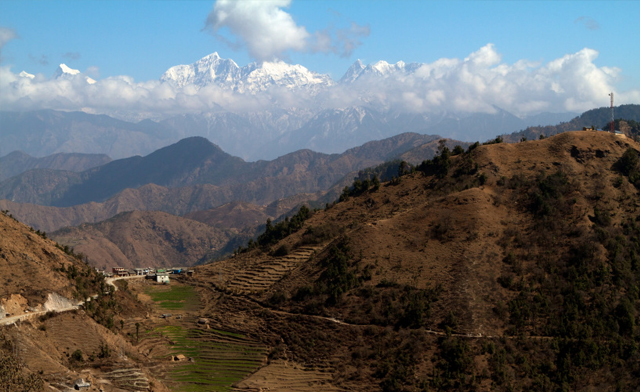The landscape of Nepal is breathtaking. You look around and take in the sheer size of what the Nepalis call “hills”. If you cast your eye upwards, and up yet again you might see the snow-capped Himalaya presiding over these hills.
I was recently in Nepal to help monitor a measles-rubella campaign. This is Nepal’s admirable and ambitious effort to reach 10 million kids with the measles-rubella vaccine for the first time ever. Kids under five are also receiving polio vaccine. It’s the largest health campaign in Nepal’s history.
In the remote region of Bajhang District there are almost no motorable roads. Households are visible up and down the endless hillsides – some perched several thousand metres high, others settled in deep valleys. So how do you mobilize 10 millions kids and their families, in a country with some of the most challenging, remote terrain in the world?
Laxmi Khadka makes it sound simple.
“We have made a list and have visited every household and invited them.”
That’s right. She has hand filled invitations to every household in her area, and walked to every one no matter how far, and personally invited every family to take part in the campaign.
Mrs Khadka is a “Female Community Health Volunteer” also known as “FCHV.” She is one of almost 54,000 women in Nepal playing this role. Everywhere I travelled in Nepal last week I saw these women, immediately visible in their striking, ubiquitous blue wraps. They helped administer polio vaccine, tallied kids who had been immunized, kept the immunization booth organized, and traveled to the main health post for more vaccines.
Immunization is only a part of their work. In Nepal’s many remote communities they are the first health link for women who are pregnant. They council them on when to visit the health post and make sure they get there for delivery. These women now also play an important role in newborn care and check in regularly on families after a baby is born.
Laxmi Khadka took part in Nepal’s last national measles campaign and has witnessed the positive results in her community. She has the same hopes for this first combined measles-rubella effort.
“We have seen a lot of children with measles before. Today we don’t see much. But we still see children with rubella and we are hopeful that with this program it will eventually be minimised. “
As we mark International Women’s Day, the Measles Initiative joins the Polio Eradication team in honouring women health workers. We pay special tribute to Nepal’s Female Community Health Volunteers who tirelessly walk up and down Nepal’s steep hills and mountains for the health of their communities.
The Measles Initiative is supporting Nepal’s measles-rubella campaign together with the Government of Nepal and critical partners including the Lions Club International.
About the Author:
Christine McNab is a public health consultant working with the Measles Initiative.





















 Prelude Version 2.3.2
Prelude Version 2.3.2